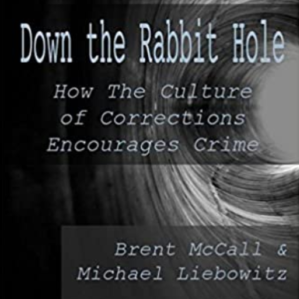“Down the Rabbit Hole”: A Book by Two Inmates
A compelling analysis of the failure of corrections.
Stanton E. Samenow Ph.D.

Reviewed in Psychology Today by Stanton E. Samenow Ph.D.
Posted Mar 12, 2021
Michael Leibowitz and his co-author Brent McCall are incarcerated at the Osborne Correctional Institute in Somers, Connecticut. The two men have written a thoughtful critique of how the “culture of corrections” not only impedes “rehabilitation” but also makes it nearly impossible.
The authors of the book, called Down the Rabbit Hole, set forth as their premise: “Those in authority seem to lack any real sense of the type of person with which the public is expecting them to deal.” They assert that the outcome is “to encourage criminal activity rather than remedy it.”
Leibowitz and McCall are not simply disgruntled inmates sounding off to voice their grievances. They have conducted extensive research on efforts to work with offenders and have provided abundant footnotes with bibliographic references.
To avoid a conflict of interest in writing this review, I must state that the authors indicate that they have read every book about crime that the late Dr. Samuel Yochelson and I have written, including the three-volume work titled The Criminal Personality. Leibowitz and McCall believe that our work sets forth the most comprehensive documentation of how criminals think and what is required to help offenders become responsible. They point out that this task requires far more than the piecemeal programming that abounds in most correctional institutions.
Leibowitz and McCall provide a scathing critique of what they have encountered in their exposure to often (but not always) well-intentioned staff. Their most basic criticism is that administrative directions “say nothing whatsoever about the nature of the criminal personality or what makes a criminal different from a responsible, law-abiding person.”
Having made this assertion, they have found from their own experience that “no philosophical coherence” exists among different programs that corrections offer. Worse yet, they declare, many programs provide criminals with “additional rationalizations” for their behavior that results in massive injury to others.
Leibowitz and McCall lament the relatively brief time that institutions devote to actual programming. They caution, “Whatever the criminal is, he is not a quick study.” They point out that approaches are used which never were designed for a criminal population. While not denigrating programs like Alcoholics Anonymous, the authors point out that they were not developed “to deal with the unique set of challenges criminal offenders present.” They clearly believe that any program based on a “disease” model has no chance of being helpful in working with criminals, who rarely take responsibility for their behavior. In fact, If criminals can pass their malfeasance off onto a disease or anything else, they will do it. Leibowitz and McCall suggest that some well-intentioned and often employed programs “can perpetuate the very conduct” that they say they aim to prevent.
The book’s authors cite a news report that states that 79% of offenders in Connecticut got arrested within 5 years of their release from custody. Furthermore, 69% of that group were arrested on new charges. Leibowitz and McCall maintain throughout, “The department’s disjointed theories and perfunctory approach don’t exactly inspire confidence.” They are especially harsh in their criticism of prison staff who fail to model responsible behavior and, in some instances, foster a culture of corruption.
There are likely to be readers who scoff at all this because they challenge the credentials of inmates who pose as authorities on the subject. Critics might even contend that these inmates mirror the very behavior they decry — that they are pretentious, narcissistic, and blaming the very people who want to help them. article continues after advertisement
I have never met the authors and so know little about their personal lives. However, having been for decades a researcher, practitioner, author, and expert witness who specializes in the area of criminal behavior, I have found that Leibowitz and McCall are keen observers with a positive objective — to help others become more effective in helping people like themselves to change and become responsible human beings. This book is definitely worth a read.
Looking for More? Listen to Michael’s very informative and interesting podcasts.

